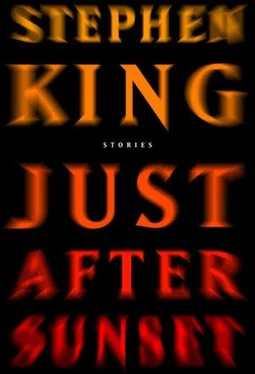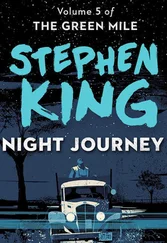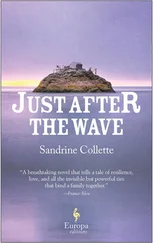Stephen King - Just After Sunset
Здесь есть возможность читать онлайн «Stephen King - Just After Sunset» весь текст электронной книги совершенно бесплатно (целиком полную версию без сокращений). В некоторых случаях можно слушать аудио, скачать через торрент в формате fb2 и присутствует краткое содержание. Город: New York, Год выпуска: 2009, ISBN: 2009, Издательство: SCRIBNER, Жанр: Ужасы и Мистика, на английском языке. Описание произведения, (предисловие) а так же отзывы посетителей доступны на портале библиотеки ЛибКат.
- Название:Just After Sunset
- Автор:
- Издательство:SCRIBNER
- Жанр:
- Год:2009
- Город:New York
- ISBN:978-1-4391-2548-9
- Рейтинг книги:5 / 5. Голосов: 1
-
Избранное:Добавить в избранное
- Отзывы:
-
Ваша оценка:
- 100
- 1
- 2
- 3
- 4
- 5
Just After Sunset: краткое содержание, описание и аннотация
Предлагаем к чтению аннотацию, описание, краткое содержание или предисловие (зависит от того, что написал сам автор книги «Just After Sunset»). Если вы не нашли необходимую информацию о книге — напишите в комментариях, мы постараемся отыскать её.
Just After Sunset — читать онлайн бесплатно полную книгу (весь текст) целиком
Ниже представлен текст книги, разбитый по страницам. Система сохранения места последней прочитанной страницы, позволяет с удобством читать онлайн бесплатно книгу «Just After Sunset», без необходимости каждый раз заново искать на чём Вы остановились. Поставьте закладку, и сможете в любой момент перейти на страницу, на которой закончили чтение.
Интервал:
Закладка:
“And sooner or later, they’ll do what any bunch of working joes will do if they’re forced to go on too long and do too much, without so much as a lousy weekend off, let alone a paid vacation: they’ll get sloppy. Start goofing off and lying down on the job. One day one of ’em won’t come in at all, and there’ll come another — if you live long enough — when one of ’em can’t come in, because he’ll be lying home dead of a stroke or a heart attack.”
“That’s pleasant. Maybe you could take it on the road. Hit the lecture circuit. Oprah, even.”
Dr. Brady unlaced his fingers and leaned forward across his desk. He looked at Richard Sifkitz, unsmiling. “You’ve got a choice to make and my job is to make you aware of it, that’s all. Either you change your habits or you’re going to find yourself in my office ten years from now with some serious problems — weight pushing three hundred pounds, maybe, Type Two diabetes, varicose veins, a stomach ulcer, and a cholesterol number to match your weight. At this point you can still turn around without crash-diets, tummy-tucks, or a heart attack to get your attention. Later on doing that’ll get harder. Once you’re past forty, it gets harder every year. After forty, Richard, the weight sticks to your ass like babyshit sticks to a bedroom wall.”
“Elegant,” Sifkitz said, and burst out laughing. He couldn’t help it.
Brady didn’t laugh, but he smiled, at least, and leaned back in his chair. “There’s nothing elegant about where you’re headed. Doctors don’t usually talk about it any more than State Troopers talk about the severed head they found in a ditch near the car accident, or the blackened child they found in the closet the day after the Christmas tree lights caught the house on fire, but we know lots about the wonderful world of obesity, from women who grow mold in flaps of fat that haven’t been washed all the way to the bottom in years to men who go everywhere in a cloud of stench because they haven’t been able to wipe themselves properly in a decade or more.”
Sifkitz winced and made a waving-away gesture.
“I don’t say you’re going there, Richard — most people don’t, they have a kind of built-in limiter, it seems — but there is some truth to that old saying about so-and-so digging his grave with a fork and spoon. Keep it in mind.”
“I will.”
“Good. That’s the speech. Or sermon. Or whatever it is. I won’t tell you to go your way and sin no more, I’ll just say ‘over to you.’”
Although he had filled in the OCCUPATION blank on his income tax return with the words FREELANCE ARTIST for the last twelve years, Sifkitz did not think of himself as a particularly imaginative man, and he hadn’t done a painting (or even a drawing, really) just for himself since the year he graduated from DePaul. He did book jackets, some movie posters, a lot of magazine illustrations, the occasional cover for a trade-show brochure. He’d done one CD cover (for Slobberbone, a group he particularly admired) but would never do another one, he said, because you couldn’t see the detail in the finished product without a magnifying glass. That was as close as he had ever come to what is called “artistic temperament.”
If asked to name his favorite piece of work, he likely would have looked blank. If pressed, he might have said it was the painting of the young blond woman running through the grass that he had done for Downy Fabric Softener, but even that would have been a lie, something told just to make the question go away. In truth, he wasn’t the kind of artist who had (or needed to have) favorites. It had been a long time since he’d picked up a brush to paint anything other than what someone commissioned him to paint, usually from a detailed ad agency memo or from a photograph (as had been the case with the woman running through the grass, evidently overjoyed that she had finally managed to beat static cling).
But, as surely as inspiration strikes the best of us — the Picassos, the Van Goghs, the Salvador Dalís — so it must eventually strike the rest of us, if only once or twice in a lifetime. Sifkitz took the crosstown bus home (he’d not owned a car since college), and as he sat looking out the window (the medical report with its one line of red type was folded into his back pocket), he found his eye again and again going to the various work-crews and construction gangs the bus rolled past: guys in hardhats tromping across a building site, some with buckets, some with boards balanced on their shoulders; Con Ed guys half-in and half-out of manholes surrounded by yellow tape stamped with the words WORK AREA; three guys erecting a scaffold in front of a department store display window while a fourth talked on his cell phone.
Little by little he realized a picture was forming in his mind, one which demanded its place in the world. When he was back to the SoHo loft that served as both his home and his studio, he crossed to the littered nest beneath the skylight without even bothering to pick the mail up off the floor. He dropped his jacket on top of it, as a matter of fact.
He paused only long enough to look at a number of blank canvases leaning in the corner, and dismiss them. He took a piece of plain white pressboard instead, and set to work with a charcoal pencil. The phone rang twice over the course of the next hour. He let the answering machine pick up both times.
He worked at this picture off and on — but rather more on than off, especially as time passed and he came to realize how good it was — over the next ten days, moving from the pressboard to a piece of canvas that was four feet long and three feet high when it seemed natural to do so. It was the biggest surface he’d worked on in over a decade.
The picture showed four men — workmen in jeans, poplin jackets, and big old workboots — standing at the side of a country road which had just emerged from a deep stand of forest (this he rendered in shades of dark green and streaks of gray, working in a splashy, speedy, exuberant style). Two of the men had shovels; one had a bucket in each hand; the fourth was in the process of pushing his cap back from his forehead in a gesture that perfectly caught his end-of-the-day weariness and his growing realization that the job would never be done; that there was, in fact, more of the job needing to be done at the end of each day than there had been at the beginning. This fourth guy, wearing a battered old gimme-cap with the word LIPID printed above the bill, was the foreman. He was talking to his wife on his cell phone. Coming home, honey, nah, don’t want to go out, not tonight, too tired, want to get an early start in the morning. The guys bitched about that but I brought ’em around. Sifkitz didn’t know how he knew all this, but he did. Just as he knew that the man with the buckets was Freddy, and he owned the truck in which the men had come. It was parked just outside the picture on the right; you could see the top of its shadow. One of the shovel guys, Carlos, had a bad back and was seeing a chiropractor.
There was no sign of what job the men had been doing in the picture, that was a little beyond the left side, but you could see how exhausted they were. Sifkitz had always been a detail-man (that green-gray blur of forest was very unlike him), and you could read how weary these men were in every feature of their faces. It was even in the sweat-stains on the collars of their shirts.
Above them, the sky was a queer organic red.
Of course he knew what the picture represented and understood that queer sky perfectly. This was the work-crew of which his doctor had spoken, at the end of their day. In the real world beyond that organic red sky, Richard Sifkitz, their employer, had just eaten his bed-time snack (a left-over piece of cake, maybe, or a carefully hoarded Krispy Kreme) and laid his head down on his pillow. Which meant they were finally free to go home for the day. And would they eat? Yes, but not as much as he did. They would be too tired to eat much, it was on their faces. Instead of eating a big meal they’d put their feet up, these guys who worked for The Lipid Company, and watch TV for a little while. Maybe fall asleep in front of it and then wake up a couple of hours later, with the regular shows gone and Ron Popeil on, showing his latest invention to an adoring studio audience. And they’d turn it off with the remote and shuffle away to bed, shedding clothes as they went without so much as a backward look.
Читать дальшеИнтервал:
Закладка:
Похожие книги на «Just After Sunset»
Представляем Вашему вниманию похожие книги на «Just After Sunset» списком для выбора. Мы отобрали схожую по названию и смыслу литературу в надежде предоставить читателям больше вариантов отыскать новые, интересные, ещё непрочитанные произведения.
Обсуждение, отзывы о книге «Just After Sunset» и просто собственные мнения читателей. Оставьте ваши комментарии, напишите, что Вы думаете о произведении, его смысле или главных героях. Укажите что конкретно понравилось, а что нет, и почему Вы так считаете.












